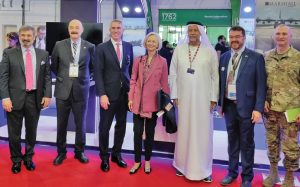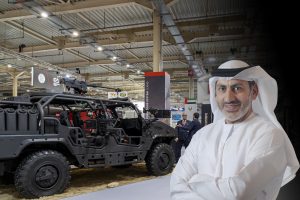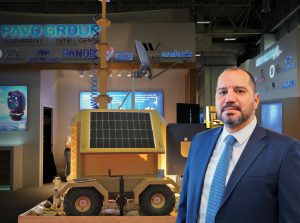At the 9th Dubai Air Chiefs Conference (DIAC) 2019 that was held on November 16, 2019 in Dubai, in which the regional and international community of air force and air defence decision-makers discussed the latest developments in strategies, operations, tactics, and technology, Al Jundi Journal reporter M. Fahed AL Halabieh met with His Excellency Major General Khalid Al Buainain, former Commander of UAE Air Force and Air Defence (Ret.) and discussed with him the recent changes to the landscape of the air warfare, its tools, emerging and future threats and how to address them, and a number of other related issues:
There is no doubt that there have been many very important changes in the air warfare scene recently, whether in terms of its tools or emerging threats that have taken place, or the challenges it faces and the like. Can you tell us about these changes and influences?
Indeed, with the passage of time, many things change and most of the things that are subject to change are the military equipment and tools, and the most important tool that entered the theatre recently are the “Drones”, or unmanned aerial vehicles (UAVs) that are expected to play an active role in future air wars. Drones were previously used for reconnaissance, monitoring and surveillance purposes, but recently, they have turned into fighting vehicles as well. Thus, these systems have become a new threat. Take, for example, the Drones that the Houthis used to launch attacks on targets in Saudi Arabia, which now need to find countermeasures to repel and defeat. On the other hand, “cyber security” was used for protecting and defending networks, but recently we witnessed a new threat represented by “cyber attacks”. Thus, cyber reconnaissance has become an integral part of any battle now. We have noticed the impact of these attacks on many critical installations and on air defence systems in particular in many of the events that have taken place in the region.
Another thing that has imposed itself as well, the influx of information which has been very large. The use of information has become very important and dangerous. In the management of battles, a person cannot now give up a complete view of the battlefield in terms of information, as well as transmitting this information to combat units. This also requires a new concept of how we should send the information to combat units and how we optimally use it in the real time to maximize its utilization.
How can air forces in this region provide their aircraft and other military systems with such capabilities?
Military aircraft now use what is known as an “IP base i.e. the Internet Protocol base that aircraft operators can use in the same way that we use the Internet, that is, they can browse and probably have access to any information in this world and select what they need for their missions. Therefore, all air, land and marine systems must contain an IP base and derive their information from them to save a lot of time and exorbitant costs that we need to amend only one piece of information in the current systems and send it to another plane or to a combat ship and the like, thus we can by new systems that rely on the “IP base” to transmit the information we want at the time to any soldier on the battlefield or to any command and control center or to any other equipment or aircraft or a ship or other system, and this is in ordinary times. Also, we must create a kind of “cloud system” or an air internet system in which all planes, including reconnaissance and refueling planes, fighters, helicopters, and all other types of planes are connected to the same network as they all operate in one operational theater. In this single operational theater, every person in his sector must have sufficient information about what is going on in order to be able to adapt to the changes in this sector and respond to them rapidly enough and with great effectiveness until the desired goal is achieved.
To what extent have our forces been able to upgrade their capabilities and acquire the necessary flexibility to adapt to emerging threats such as “drone swarm attacks”, like the ones Saudi Arabia suffered from and had to deal with them at a high cost by using the very expensive Patriot missiles compared to the very cheap Drones?
This issue mainly relies on countermeasures and counter- countermeasures. For example, “Drones” had not been around a few years back, but when they appeared, we had to develop our air defence system. These tools are cheap and the most dangerous thing is that they have long range and accuracy at the same time. What is more dangerous is that their radar cross-section is very small which makes them difficult to detect. These “drones” have also become trans-border threats. Therefore, the matter does not only require a comprehensive modernization of the air defence systems, but also requires bilateral cooperation between the neighboring countries and especially among the GCC countries so that we can provide our forces with an early warning, and this is very important. I stress here a holistic view of the issue, while we are still at the beginning of the road. This is the first time that the area has been attacked with swarms of Drones (the attack on Aramco). The Kingdom of Saudi Arabia, as everyone knows, is a vast country as if it were a continent, and our Saudi brothers were surprised by the arrival of these drones in the center of Saudi Arabia. And this happened for a simple reason because until recently we were fighting battles on a defined frontline of combat, but now the image is different and the whole country has become a battlefield. There are no more distinct boundaries for the battlefield. The land of the whole country, and every inch of the country’s land is targeted now. Therefore, our view of things must now differ based on these developments and their data. It is almost impossible for any country – even if it is a small area – to place air defences and radars in every inch of its land, but here comes the role of creativity to devise other alternative means and solutions.
We in the UAE always look at quality, not quantity, when choosing weapons systems. Therefore, thanks to our political and international relations, we have one of the best types of weapons in the world.
Based on these data and new circumstances, what do we have to do in the Emirates?
The outlook has begun to shift in the UAE from obtaining these advanced weapons from abroad to manufacturing them inside the country, with Emirati hands and competencies. And this is a maturity of thinking and planning, of course, because these weapons are all expensive. When we manufacture these weapons by ourselves, they are less costly, and neatly customized to the needs of our armed forces.
To what extent can we benefit from the ideas presented by air leaders in this conference and similar conferences and forums held on our land to find solutions to the threats and problems facing our region?
There is no doubt that this conference has great and immense benefits, as we host most air leaders, experts, and specialists in the world, exchange ideas with them, and benefit from their long and practical experiences and lessons learned from the battlefields, and then align them with our needs and our measurements. If you noticed that most of the leaders speaking here participated in the first and second Gulf War side by side with our armed forces, and this made the relationship with them close and characterized by transparency and trust. This has evolved, of course, to establish strategic cooperation, whether at the level of political declaration or at the level of operational coordination, and this is a big achievement of course. On the other hand, as it is associated with the Dubai Airshow, which will open in one day from now with the participation of more than 1300 defence equipment manufacturers who will display their latest technologies here and show them to us, this conference has acquired great importance. Since we have moved from the principle of purchasing equipment and technology to manufacturing them ourselves, we in turn choose the technology that suits us and fits our defence manufacturing plans and then we negotiate with the companies concerned to transfer this technology to us through mutual cooperation frameworks that benefit both parties.
We in the Emirates had more than 25 independent companies manufacturing defence equipment, but they lacked coordination among them whether at the level of manufacturing, financial support or specialization, but after the announcement of the establishment of “EDGE” conglomerate, most of these companies and others were merged under its umbrella. EDGE became governed by the National Industrialization Strategy as well as the Armed Forces Strategy. With this, we have a unified manufacturer with a unified national strategy, so technology transfer, dealing and specialization are much better than before. The other thing is that we have now combined technology transfer and knowledge transfer, and there is a very big difference between the two. While we transfer technology to our national factories, we transfer knowledge to universities and educational institutions in the United Arab Emirates, because manufacturing requires scientific and technical cadres and a cadre of researchers to develop products.
How willing are these companies to transfer advanced technologies to us, especially since some of them have restrictions or reservations about what they call “sensitive technologies”?
We, in the UAE, praise be to God, have no problem in this regard, except for America, because of its ITAR law that places restrictions on the export of weapons outside the United States. But most of its technology is available outside the United States. If the United States agrees to sell us what we need of a certain technology, it is OK, but if it does not agree, there are many alternatives on the market.
Is there a message that you would like to send to our armed forces on this occasion through Al Jundi Journal?
Our forces, by the grace of God, are professional forces, and they have proven their efficiency in the Yemen war and in the tasks entrusted to them in other parts of the world. They have carried out their national duty there, whether these tasks are combat, peace-keeping, or relief. We insist and work hard to fully enhance this professionalism of our valiant armed forces. I would like to pay tribute here to our wise political leadership, who has spared no effort in providing our armed forces with the latest weapons and equipment in the world. Now we, the military, have the responsibility on our shoulders, as we must be at the best of our leadership’s expectations and ambitions, which has not left any justification for any negligence of any of us at all. Therefore, we must achieve a high-level professionalism that is in the form of operations principle that is used and circulated. We must also invest in training and most importantly, in the human element, i.e. by preparing the intellectual, the leader and the planner, this at the level of the officers. As for the lower levels, especially the level of soldiers, we must prepare the professional technical soldier. Besides self-development of the human element, This is what officials and commanders of our armed forces focus on. We must not only be satisfied with the knowledge given to us during the courses that we are subjected to to develop our capabilities, there are in this age rich sources of information such as the Internet and other sources that we can benefit from to enrich our military information by looking at the experiences of others through the long history of the various armies and armed forces in various parts of the world and across all eras, including the era of enormous technological progress that we live in, and in various environments and conditions.
Interviewed by: Mohamed Fahed AL Halabieh – Photography by: Mohammed Alshaer













